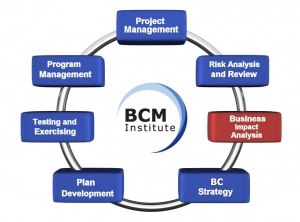Part 5: Inter-dependencies DR



Part 6: Inter-dependencies
Business Function and Function Code (Col 2 & 3)
Cross-reference to the Business Function/function code or number from original Function No assigned in Part 1
Name of Business Unit or Vendor/Supplier/Outsource Partner (Col 4)
The internal business unit or external vendor, supplier or outsource partner that each business function has a dependency with
- This Dept/Unit/Vendor/Supplier/Partner is inter-dependent on the Business Function.
- Note (1): There should be a one-to-one relationship between every source and target Dept/BU with the exception of external agencies e.g. Central Bank, government ministries and agencies, common organizational support units e.g. IT, Human Resource, Finance.

Type of Dependency (Col 5 to 6)
The various types of dependencies that each business function may have as below:
- X is Upstream to the business function
- X is Downstream from the business function
- X has Mutual Dependency with the business function
Internal/ External (Col 5)
- This column details what type of relationship is shared between the Business Function and the Business Unit/Vendor/Supplier/Partner.
Possible Dependencies (Col 6)
There are 3 possible dependencies:
- Upstream
- Downstream
- Mutual dependency
Notes
- If the Source Dept/Unit and the Target Dept/Unit are the same department/unit, then, there may be a need to identify the sub-unit level e.g. Finance-Account Payable and Finance Account-Receivables.
- Be cautious that this is usually not needed except for special cases.

Description on Nature of Dependency (Col 7)
Indicate the nature of dependency and flow of information/ transaction, i.e. hardcopy reports, faxes and emails between business units and external parties for each business function. Examples are:
- Customer is Upstream to Sales for order confirmation via email or fax
- Payroll outsourced vendor and HR has Mutual Dependency on payroll processing as HR will provide monthly payroll changes via email, and payroll data on thumb drive via manual dispatch to the outsourced vendor, subsequently outsourced vendor will confirm completion of payroll data processing via email and return processed payroll data back to HR on thumb drive via manual dispatch
- Citibank is Downstream from HR as HR will provide monthly payroll release instructions via email and the processed data on thumb drive vial manual dispatch.
- In this section, describe the nature of the dependency between the two different units.
- Elaborate on the nature of the relationship between both units.
Instruction to BL-DR-3/5 M2 Participant
Refer to the text of each of the sections within this page which is highlighted in italics for further explanation when attempting the Module 2 assignment.
When completing the inter-dependencies (Part 6) of the BIA Questionnaires, this template focus on the inter-dependencies of the upstream and downstream dependencies.
These are some of the observations made during the review of Part 6: Inter-dependencies. Participants completing this form should review this list before submission.
- Each row should have only one "source" and one corresponding "target" department. If there is more than one, please create another row starting with the same function number.
- An example is:
- (Upstream) Human Resource sending the employees' payroll to (Downstream) Finance
- (Upstream) Finance sending the payroll file to (Downstream) ABC Bank (External parties)
